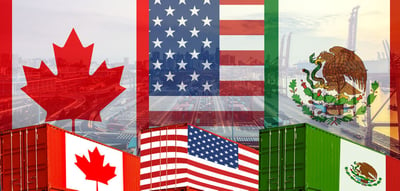CUSMA: What’s next for Canadian importer/exporters?
While the U.S. has ratified the new North American free trade agreement between Canada, the U.S., and Mexico, the document has yet to be ratified in Canada.
Until the Canadian government ratifies the agreement and drafts the “Unified Regulations,” there are no definitive answers about how the agreement impacts Canadian importers and exporters. However, we have gleaned some information from the text of the agreement itself and from the Canadian government’s feedback.
What’s the agreement called anyway?
It is common practice for countries in an agreement such as this to put the name of their country first.
So, there are three different names for this single agreement, depending on which country one lives in:
- In the U.S.: the United States, Mexico, Canada (USMCA) Free Trade Agreement
- In Canada: the Canada, United States, Mexico (CUSMA) Free Trade Agreement
- In Mexico: the Tratado Entre México, Estados Unidos y Canadá (T-MEC)
Canada last to ratify
 Bill C-4, the Act to Implement CUMSA has passed its second reading and has been referred to the Standing Committee on International Trade for consideration.
Bill C-4, the Act to Implement CUMSA has passed its second reading and has been referred to the Standing Committee on International Trade for consideration.
The Committee has invited interested Canadians to provide brief summaries of their views and recommendations for further deliberation. This will provide Canadian companies an opportunity to express any concerns they may have about the potential impacts of the new agreement. It is not clear, at this time, how long this process will take.
Since Canada is the last country to ratify the Agreement, the Protocol to replace NAFTA ensures that CUSMA will enter into force, no earlier than, the first day of the third month after ratification. So members of the trade community still have a few months to prepare.
The future of the NAFTA Certificate of Origin
Once CUSMA enters into force, it will completely replace NAFTA, meaning that anyone trying to claim duty relief must do so under the CUSMA origin and certification rules. The NAFTA rules will no longer apply.
In the meantime, the NAFTA rules continue to apply and Canadian importers can still claim relief based on NAFTA Certificates of Origin.
While there was a formal NAFTA Certificate of Origin, NAFTA also accepted other forms and formats, as long as they contained the identical data elements of the formal CO.
CUSMA Certification of Origin
Under the current CUSMA Agreement, and this will likely not change, there is no prescribed format or form for a Certificate of Origin.
However, Annex 5-A stipulates the set of minimum data elements that must be used to indicate that the a good qualifies as originating under the CUSMA Rules of Origin and meets the requirements of Chapter 5 – Origin Procedures.
Undoubtedly, there will be many certificate templates that will be created and circulated by service providers and they will all be considered valid as long as they adhere to the Annex 5-A minimum data elements.
Also, under this Agreement, some importers may be able to issue a certificate of origin. However, at this time the conditions under which this would be accepted have not been published. We would strongly recommend that importers do not issue their own certificates of origin, until these conditions have been clarified.
Annex 5-A minimum data elements
- Importer, exporter, or producer certification of origin
- Certifier contact information
- Exporter contact information
- Producer(s) contact information
- Importer contact information
- Description and HS tariff classification of the good
- Origin criteria under which the good qualifies
- Blanket period of certification covers multiple shipments
- Authorized signature and date
Our customs consultants are here to answer any questions you might have about the progress of the new trade deal and how its implementation will affect you.
Information provided by: NAFTA & Free Trade Dept. - Cole International
Understanding Free Trade. It's what we do.
Suggested Articles on the new North American Free Trade Agreement:

